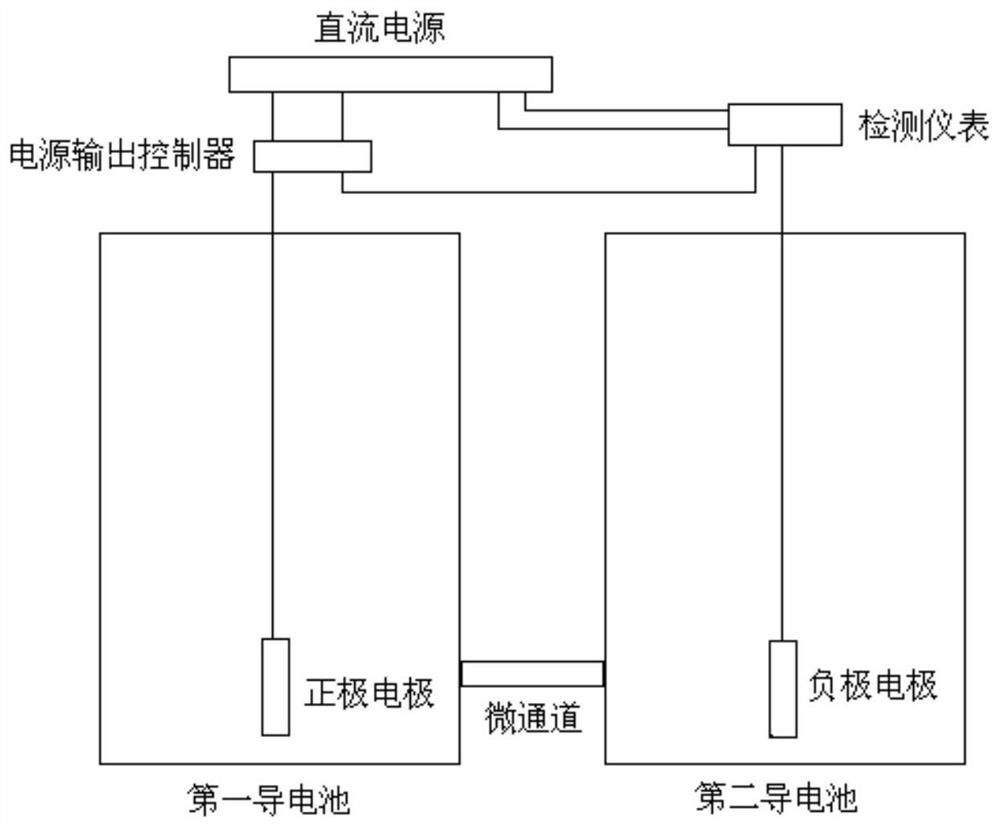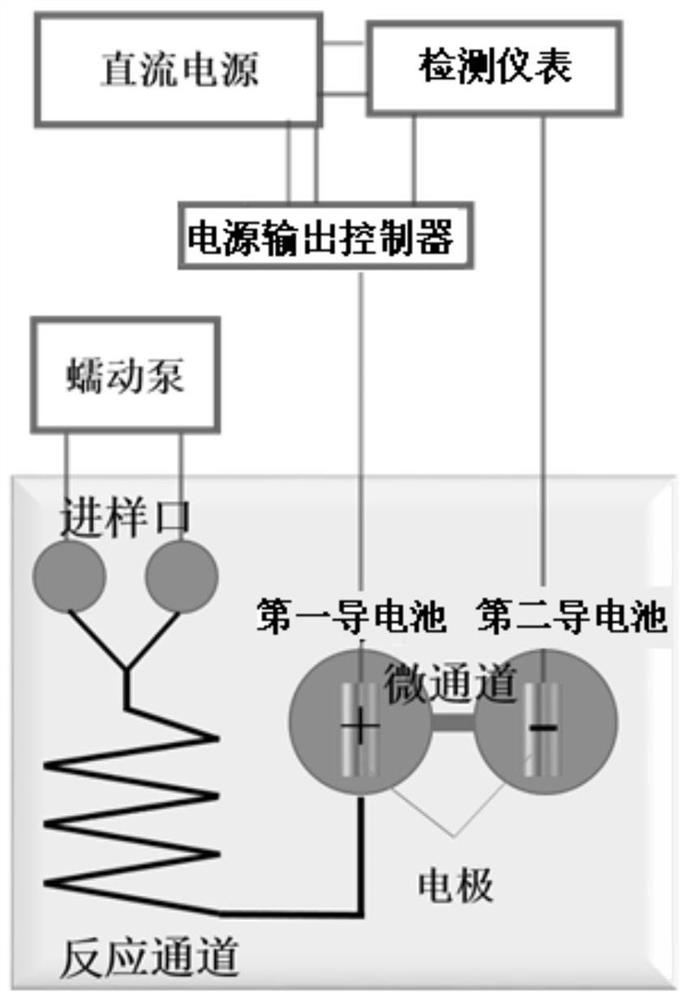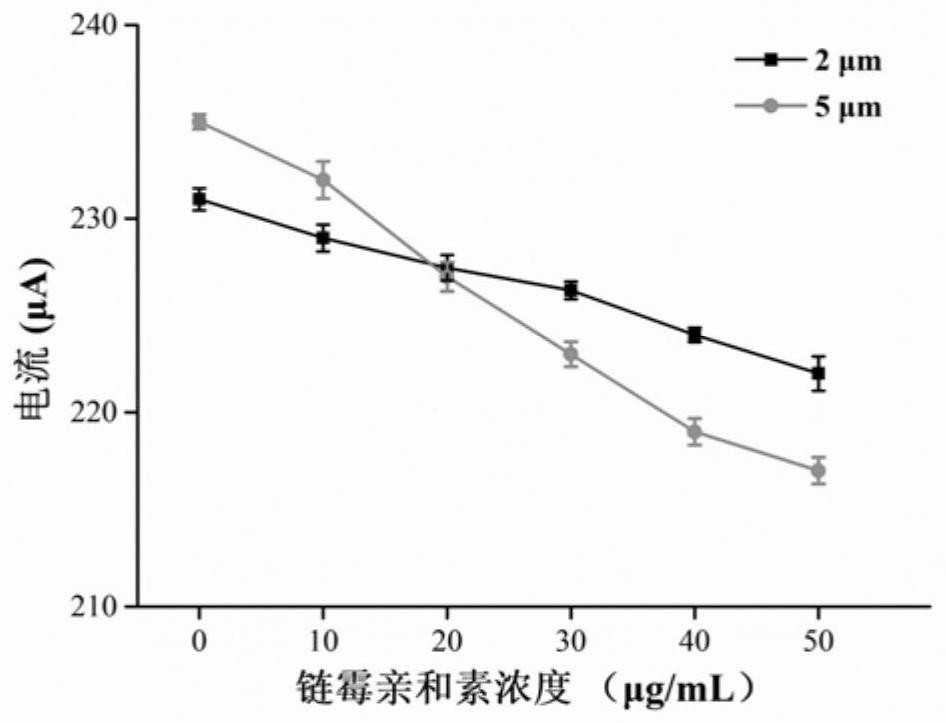Homogeneous analysis method based on micro-channel resistance change caused by state change of insulating microspheres
A microchannel and phase analysis technology, applied in the detection field, can solve the problems of complex principle, high cost and poor stability of the homogeneous determination method, and achieve the effect of stable and reliable method, good accuracy and strong anti-interference ability
- Summary
- Abstract
- Description
- Claims
- Application Information
AI Technical Summary
Problems solved by technology
Method used
Image
Examples
Embodiment 1
[0050] Example 1 Construction of a homogeneous analysis device and a microfluidic chip
[0051] Such as figure 1 As shown, a homogeneous analysis device based on the change of the dispersed state of the insulating microspheres causes the change of the resistance of the microchannel, the device includes a first conductive cell and a second conductive cell, and the first conductive cell and the second conductive cell are arranged between There are microchannels, the inner diameter of the microchannel is 10-500 μm, and the length is 0.5-10 mm. The inside of the first conductive cell and the second conductive cell are respectively provided with a positive electrode and a negative electrode, and the positive electrode and the negative electrode are Connect the positive and negative poles of the DC power supply through wires respectively to form a closed-loop circuit. The closed-loop circuit is equipped with a detection instrument and a power output controller. The detection instrum...
Embodiment 2
[0053] Example 2 Correlation between microchannel resistance and dispersion state of insulating microspheres
[0054] To explore the correlation between the resistance of the microchannel and the dispersion state of the insulating particles, the biotinylated PS microspheres were mixed with different concentrations of streptavidin, and added to the conductive cell 1, PBS was added to the conductive cell 2, and the voltage was applied. , while recording the current in the loop, as follows:
[0055] Test 1) The inner diameter of the microchannel is 25 μm, and the length is 1 mm; the diameter of biotinylated PS microspheres is 2 μm, and the concentration is 100 μg / mL; the concentrations of streptavidin are 0, 10, 20, 30, 40, 50, 60 μg / mL; mix equal volumes respectively, incubate for 15 minutes, take 300 μL of the reaction solution and add it to the conductive cell 1, and add 300 μL PBS solution to the conductive cell 2; apply a 60v DC voltage to measure the current in the circuit....
Embodiment 3
[0067] Embodiment 3 adopts homogeneous analysis method to detect chloramphenicol
[0068] The detection principle of chloramphenicol is as follows: in the conductive cell 1, PS microspheres modified with chloramphenicol antibody, PS microspheres modified with chloramphenicol-BSA conjugate, and chloramphenicol in the sample undergo a competitive immune reaction. When there is no chloramphenicol in the sample, the PS microspheres modified by the chloramphenicol antibody and the PS microspheres modified by the chloramphenicol-BSA conjugate combine to form a complex, thereby increasing the proportion of particles in the aggregated state in the solution; when the sample When there is chloramphenicol in the medium, the PS microspheres modified by chloramphenicol and chloramphenicol-BSA conjugates will compete to bind the PS microspheres modified by chloramphenicol antibody, resulting in a decrease in the proportion of particles in the aggregated state. The higher the content, the le...
PUM
| Property | Measurement | Unit |
|---|---|---|
| length | aaaaa | aaaaa |
| particle diameter | aaaaa | aaaaa |
| length | aaaaa | aaaaa |
Abstract
Description
Claims
Application Information
 Login to View More
Login to View More - R&D
- Intellectual Property
- Life Sciences
- Materials
- Tech Scout
- Unparalleled Data Quality
- Higher Quality Content
- 60% Fewer Hallucinations
Browse by: Latest US Patents, China's latest patents, Technical Efficacy Thesaurus, Application Domain, Technology Topic, Popular Technical Reports.
© 2025 PatSnap. All rights reserved.Legal|Privacy policy|Modern Slavery Act Transparency Statement|Sitemap|About US| Contact US: help@patsnap.com



